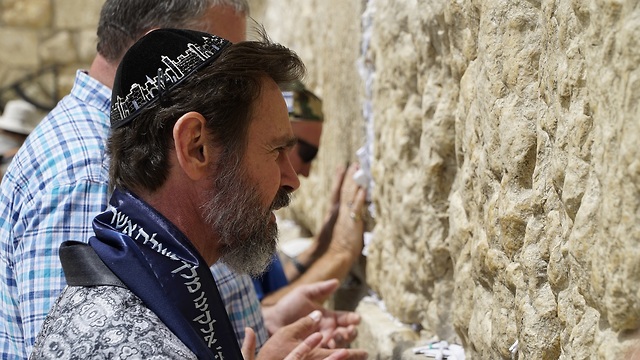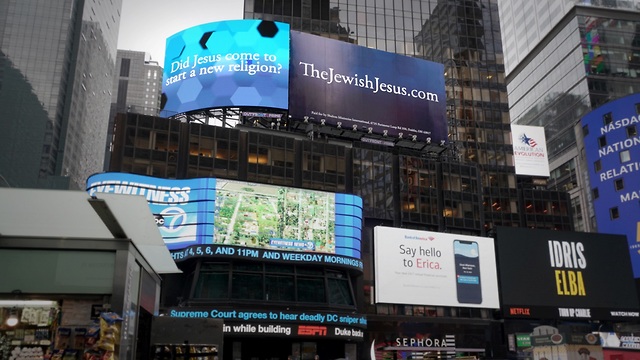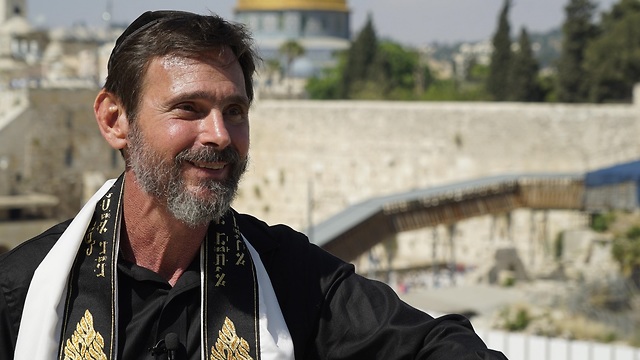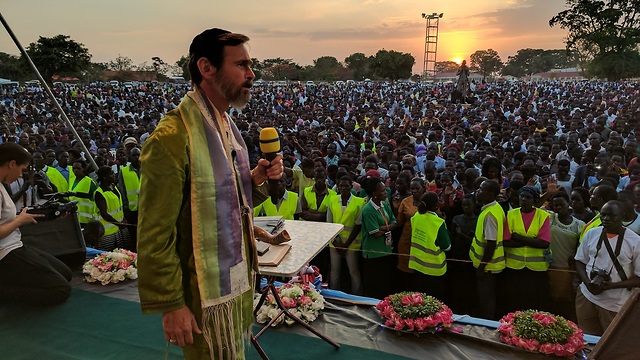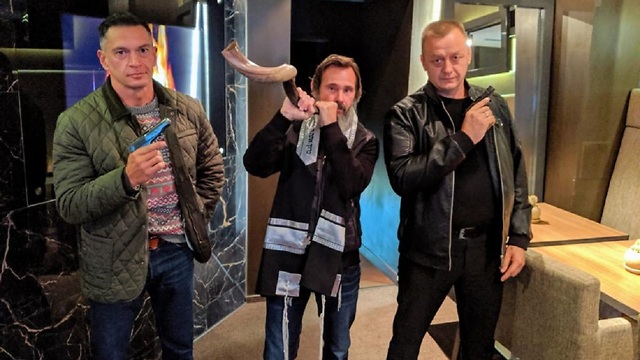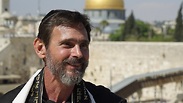

The millionaire trying to sell Messianic Judaism to the world
Millions watch him on television and online, he has built an empire from donations, blessed Trump before the election and almost bought a house next to the Western Wall; a 'rabbi' in his own eyes, former wrestler Kirt Schneider leads the movement that Judaism warns against
When he visited the Western Wall in Jerusalem last May, many of the traditional Jews there could not have known that this controversial “Rabbi” Kirt Schneider - with a graying beard, a kippah, tsitsit and a tallit (Jewish garb) - was not really a rabbi.
Although he was born a halachic Jew to two Jewish parents and had a bar mitzvah, today he defines himself as a Jew who believes in Jesus.
The 61-year-old former accomplished wrestler, who lives in Columbus, Ohio, is one of the world's largest and best-known Jewish-Messianic preachers, a kind of superstar in certain circles.
While in Israel last May, he looked out from the Western Wall towards the Jewish Quarter and saw a huge "for sale" sign. He called the number on the sign and arranged a meeting with the realtor who showed him three properties with a view of the holy site.
Schneider was interested in the largest and most expensive of the three properties: a 400 sqm apartment with a 20m-long window overlooking the Western Wall. He fell in love with the house and was not alarmed by the price of $8 million.
But, considering a scenario in which Israeli authorities could prevent his entry because of his religious activity deemed unacceptable in Israel and the Jewish world, Schneider understood that he may not have access to his $8 million investment, which would effectively go down the drain.
Realizing his potential buyer was a Messianic Jewish rabbi, the realtor grew alarmed and informed Schneider that he would not be able to buy the property as it was for residential use only. Had the deal not blown up, one can only imagine the reaction had the ultra-Orthodox discovered that a Messianic Jewish TV star was sitting in the heart of the Jewish Quarter and broadcasting from there to the world.
So, who is this star of a movement that repels so many in Judaism? In a conversation with Ynet, Schneider recounts his life story, describes "miracles" that he witnessed, explains how he keeps the Sabbath in his own way.
Messianic Jews are a group who believe that Jesus was the messiah but who also identify as Jews. They use both the Old and New Testaments and adhere to Jewish holidays, traditions and customs.
While members of Messianic congregations define themselves as a part of Judaism and declare that any Jew who accepts the Messianic faith has not left Judaism for another religion, they are not seen as legitimate by any of the movements in Judaism.
For many Jews - especially in the United States - they are viewed as a serious threat and as such there is a deep animosity felt towards them by many rabbis, especially in the Orthodox streams.
While the symbol of Christianity is the cross, the symbol of Messianic Judaism contains a Menorah, a Star of David and a fish, the latter symbolizing the "miracle of the five loaves and two fishes" attributed to Jesus in the New Testament.
Worldwide, some 300,000 Christian believers identify themselves as Messianic Jews, of whom 175,000 to 250,000 are in the United States.
Orthodox rabbi and author Tuvia Singer, one of the leaders of the movement against Messianic Judaism and its missionary work, says there is no real data on the number of Messianic Jews.
"The estimate of a quarter of a million in the U.S. is probably correct," he says. "In Israel, I estimate that there are no more than 10,000. Halacha (Jewish law) states that if your mother was Jewish, you remain Jewish, but because they believe in Jesus you can no longer call them Jews.
"They only adopt the external customs such as the kippa and tsitsit. They do not keep the Sabbath as it is in the Torah and do not keep Kosher as it is in the Torah."
To Singer, there is no difference between Messianic Jews and Christianity.
"What the leaders of the Messianic movement sell is of absolutely no value. They make a distinction between Messianic Judaism and Christianity to convince people to believe in Jesus. There is no theological difference between what Schneider believes and what evangelical Christians believe. They say exactly the same thing. The only differences are that they use the name 'Yeshua' (instead of Jesus) and will not talk about converting to Christianity."
According to Singer, the concept of messianism developed after evangelicals gathered in Switzerland "and asked why the church had failed to convert Jews to the religion. They are missionary through and through believing that conversion of the Jews will bring about the second coming of Jesus. We have to be really careful of them."
Singer calls call Messianic Jews "the opposite of the Bnei Anusim (descendants of 14th and 15th century Spanish Jews forced to convert to Christianity). The Bnei Anusim were externally Christian but in their homes, they were entirely Jewish. The Messianic movement appears Jewish on the outside but on the inside – its believers are entirely Christian."
Blessing Trump
Schneider became famous in the Christian and Messianic world as a result of his weekly television programs, which are broadcast on more than 30 Christian channels in almost 200 countries around the world - including the Christian channel that airs on the Yes satellite and Hot cable companies in Israel. His shows have 1.6 million viewers every week in the U.S. alone.
Schneider’s organization is a communications empire: He has 1.5 million followers on Facebook, Twitter and YouTube. It was no surprise then that in September 2015, he was invited to the Trump Tower in New York along with another 40 evangelical religious leaders - to bless the real estate mogul turned politician, whose lawyer Jay Sekulow is a Messianic Jew.
Schneider laid his hands on Trump's head and said (in a video at the beginning of the article): "The only two nations in a special relationship with God are Israel and the United States of America.”
“In the name of Jesus if you bring this man into the Oval Office, I speak your blessing over him for the sake of your people…. Donald Trump, God bless you and keep you. May God lift you up and give you peace. "
What do you think of Trump?
"I don't think anything of him. He is figure for a time such as this. I blessed him and prayed for him as I would for any leader who asked me to. The Bible in the New Testament commends us to pray for kings and all those in authority so that we will live a good life on earth.
"You want your leaders to be wise so that people will live in peace. I would also pray for (former president Barack) Obama and any leader who would ask me, including Bibi (Prime Minister Benjamin Netanyahu).
"I personally like the courage of President Trump. I like that he is not afraid to make decisions that others would be fearful of making. I am very happy about his decision to recognize Jerusalem (as the capital of Israel)."
Schneider's business model includes an appeal at the end of each program for donations from the public.
In the evangelical world to which Schneider mainly broadcasts, he is considered a huge success.
He employs more than 40 staff, producers and photographers, and owns a state-of-the-art television studio. On his travels abroad, he steps out with bodyguards.
"We have more than 57,000 homes that have supported us over the last two years," Schneider says. "We send them a monthly newsletter with spiritual devotions. We send them a holiday calendar. Eighteen thousand people signed up with direct debit and faithful monthly support."
The average donation, he says, is $59. "Once we received a $80,000 donation. People donate to us because they want to partner with God, because they believe in our mission."
Last April, Schneider’s organization paid $400,000 for two huge billboards in New York's Times Square, which ran for two months.
On one was written: "Is Jesus Jewish or Christian?" The second had a link to Schneider's website theJewishJesus.com. According to Schneider, the purpose of the billboards was to create dialogue and "drag" Orthodox Jews into an argument with him.
Are you a missionary?
"I do not see myself as a missionary. I am a messenger. I am not trying to convert Jewish people to another religion but wanting to bring the message that Yeshua is the Jewish messiah, the messiah of Israel and the savior of the world.
"I am not focused on the Jewish people only, I am a worldwide messenger. I want to change the face of Christianity. I take modern day Christianity out of a Gentile culture, and plant it back in the Jewish roots from which it actually came. Most Jewish experts also admit that the people who originally followed Jesus and from which the Christian movement grew were Jews."
Wrestling and enlightenment
Schneider was born in Cleveland, Ohio to Jewish parents. They lived in the prestigious Beachwood suburb, where 90 percent of the inhabitants at the time were Jewish. The schools were closed on Rosh Hashanah and Yom Kippur because they knew the students would simply not show up.
Schneider's father was the son of immigrants from Russia and Poland who founded a successful clothing store. His mother was a clothes designer who opened her own design store. A very affluent family.
From an early age Schneider displayed athletic ability and began to wrestle from seventh grade.
"I didn’t feel there was anyone I could not beat," he says. "I worked harder than anyone else. My friends called me 'Tiger'."
His dream was to become the world champion in his weight class.
"I lived for wrestling. I would lie in bed every night imagining myself with my arm raised up by the referee as world champion. I would shudder."
At age 18, he went through a personal crisis and, even though he received a college wrestling scholarship, he stopped competing in the sport.
"I realized there was no future and it was empty. Wrestling was over for me. I lost control and was vulnerable. I realized that there were forces in life that were bigger than me. It caused me to have an identity crisis. I was afraid of getting cancer or being involved in a car accident, and I became aware that the devil was real. I was lost and scared.”
Seeking to revive his interest in life, Schneider began practicing yoga and meditation and planned to open a disco. The search for identity unsettled him and one day in 1978, he says, he went to sleep, and suddenly woke up and experienced what he calls "divine revelation."
Jesus appeared to him in a vision, he says, and suddenly a ray of red light from the sky beamed down on Jesus’ head.
"Until that moment, I didn't know anything about Jesus. Jesus was not a part of our lives as Jews. When I saw the red light on his head, I knew that God was revealing himself to me and that he loved me and was showing me the way to himself. It took maybe two seconds, but it was a moving experience."
After that "revelation", Schneider changed his life and began to attend "Tikvat Israel," the messianic synagogue in Cleveland. This caused a serious crisis in his family, which could not accept that the eldest child chose Jesus. HIs parents were at a loss.
Among other things, they brought him to a “deprogrammer”, a person who specializes in rescuing young people from cults. They also hired a psychiatrist who hospitalized him. Accompanied by a police escort to the hospital, Schneider was locked up in a closed ward for 2 months, until an expert committee determined he was sane and he was released.
“It felt to me as though my father hated me during this time," Schneider says. "I, his eldest son, was a terrible embarrassment for him. My parents were worried because they knew I was lost. I totally understood their concern. But the real issue was Jesus and the fact that I was telling them that he had appeared to me in a vision.
"They thought I was crazy. My friends told me I seemed fine but due to my new direction in life, I eventually lost their friendship."
After he was released, Schneider left home, worked in California for several months, eventually returned home and met his future wife Cynthia. After they married, they both went to a Bible school that belonged to a group of evangelical churches that train Pastors.
He has been calling himself a rabbi for 16 years, though he never received a rabbinate certification.
"I'm not a rabbi in the traditional way of going to an Orthodox Yeshivah. But I'm a rabbi for more than a million people who get inspired by my teachings. A rabbi is a teacher, so for them, I am a rabbi. Many Jews say I am imposter. I believe the real issue is not if I am an authentic rabbi, but if Jesus is truly the Messiah.”
“If Jesus is the Messiah, then it makes me the most authentic rabbi because I point to the true Messiah. I fulfill my mission as a Jew to be a light to all the world. In answer to the question, ‘are you a Jew or a Christian’ – is like comparing apples to oranges. I was born Jewish and will always be Jewish. No one disagrees that Jesus' disciples were Jewish. No one disagrees that his early followers were Jewish.
The 'fake rabbi' who is 'worse than a Nazi'
In addition to his television shows Schneider is also invited to preach to congregations around the world: in Africa, Eastern Europe, the U.S., Cuba, Haiti, and Israel (to the messianic congregations in Jerusalem and Ashdod).
In Africa, tens of thousands of people attend his sermons. In Nigeria, 100,000 people gathered together. In Africa and Haiti, he performed exorcism ceremonies, and Schneider prides himself on the fact that during his sermons God performs miracles through him. In videos of his sermons, the audience is seen in ecstasy as he speaks and blasts the shofar.
What do you answer to those who say you are crazy or weird?
"My answer is that the proof is based both in scripture and the results. We have seen miracles happen. It is God who uses me to perform the miracles. It is greater than me. I cannot control who God will heal. But when I preach, God heals through me."
Schneider recalls such a case in the Ugandan city of Lira.
"A woman who was blind for 15 years was brought to my meeting. On Sunday I said, 'blind eyes open' and when I said that and blew the shofar - lightning came down from the sky. The woman realized when she heard the shofar, that something happened that healed her.
"Tears came out of her eyes and she started to see again and was completely healed. During this meeting, the deaf began to hear, people were delivered from demonic possession, the mute spoke, the lame walked, and many diseases were healed. The Bible says these signs will cause people to believe. "
Recently, Schneider began growing the sidelocks worn by observant Jewish men to "stand out as a unique person who represents God. When people see it - they realize it's different, it's not part of the culture of the world."
Do you keep the Sabbath and kosher?
"I do not follow all Orthodox laws and do not believe in laws invented by man. I am committed 100 percent to Shabbat, to celebrate Shabbat and to remember Shabbat. On Shabbat I will disconnect from technology. I will not send text messages, except for family members.
"I will not cook, unless it’s something simple. I do not work. I try not to leave the house or drive. I also try to avoid flying on Saturday. I keep kosher in the sense of no pork, no bacon, no crab etc."
In a Cleveland Jewish Journal, Schneider was called a “fake rabbi.” Jews sometimes condemn him by saying " you are worse than a Nazi" and "you steal our people." In recent years, he has been completely detached from his family.
A gloomy prophecy
Schneider thought he would immigrate to Israel, but because he believes in Jesus, he is considered to be someone who converted his religion and therefore is not be eligible for immigration under the Law of Return.
Schneider frequently visits Israel while filming his programs. "In Israel there are between 30,000 to 50,000 Messianic Jews," he claims, but other estimates speak of about 10,000 or slightly more.
In all his lectures, he often blows a large shofar. Although he is relatively small in size, he manages to emit a very powerful sound from the shofar. "Sometimes God uses the shofar as a way to communicate. The shofar declares the kingdom of God," he explains.
Is there any chance you will repent and return to Judaism? "In my view, I am observant but, in my way - to Jesus."
Schneider admires the ultra-Orthodox Jews and their way of life, and also studies Kabbalah (Jewish mysticism). He has a gloomy forecast for our world: "The situation in the world will get worse before there is a final redemption, which is the coming of Mashiach (Christ).
"Evil will become more and more tangible - and the world will sink into a deeper darkness and then a false leader will emerge. The world will put their trust in this leader to save it in the same way the Germans trusted Adolf Hitler in the 1930s and 40s. Then there will be mass destruction. At this point Mashiach (Christ) will be revealed, will destroy the false leader and the forces of darkness. He will then establish the Kingdom of Heaven.
Should Israel beware of evangelicals?
"Most evangelicals love the people of Israel very much, but it is true that some of them see the Jewish people’s conversion to Christianity as a step to the world’s ultimate salvation."
Schneider sometimes acts impetuously. For example, during his visit to Kiev in the world's largest Messianic Jewish community (2,000 people), he asked two of his bodyguards to take out their weapons to take pictures with him while he was blowing his shofar.
Speaking to the audience, he asked the bodyguards to lift him like a guru performing transcendental meditation rising above the ground to demonstrate what attracted him to yoga.
Schneider's shofar, which he bought in Israel, also got him in trouble in the past when he visited Zambia: The security check found it in his wife Cynthia’s suitcase. One of Schneider's assistants took charge and was arrested on suspicion of illegal animal hunting.
The assistant was taken into custody overnight and was brought to trial, in the city where Schneider’s meetings had been held.
After several witnesses were brought forward, he was released when the authorities become convinced the shofar was a religious item bought in another country and he had not illegally poached an animal there.
“We were all deeply concerned because we did not know how it would end. As you know in Africa, sometimes the law can be very arbitrary. Baruch HaShem, it ended well.”














